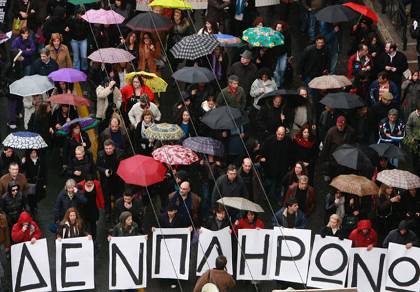Let us straight away point out that the concept of youth is uncertain and even improbable if it is taken to mean a homogenous generational melting pot, ignoring the many fracture lines combined and superimposed on it.
In fact, the generational dimension, far from existing in the abstract, is constantly traversed by fundamental social markers such as class origin, ethnic origin or gender, which often re-emerge in the form of discrimination. The political socialisation of young people takes shape in predetermined historic conditions, made up of continuities and breaks, of convergences and divergences. It undergoes multiple trials and extendable temporalities that yield a very different view that young people have of politics, pushing then away from electoral participation and towards commitment to local issues.
There is a second mistake that needs to be put into perspective. This is the tendency often to think of young people as a sector that magnifies or exaggerates the behaviour patterns and values found in the rest of society. It is thought that they transmit, in a heightened way, rather negative tendencies such as individualism, depoliticisation and even conformism.1 Inversely, there is another oversimplified view that the young are spontaneously “in revolt”, avid for civic commitments and spontaneous activism in movements like the “indignados” that are likely to “get things moving”.
Yet, if in certain ways the youth are culturally distinct, such as in their way of communicating in networks and the use of new information technologies in some areas, they are not so distant from other parts of the population. As Guy Michelat and Michel Simon explain in their work Les Ouvriers et la politique,2 French young people are no more in favour of economic liberalism than are their parents. They are, on the other hand, much keener on cultural liberalism. Moreover, while they may, on the whole, vote more left than other age groups, this affinity for the left tends to fade. The gap between the generations’ electoral choices narrows with time.
An economy of uncertainty
Young people live in a competitive universe that perpetually and massively engenders uncertainty. They are aware of the intense self-mobilisation that is required to affirm oneself professionally. They know that to “succeed” they have to be entrepreneurs of their own promotion. Finding employment now appears not so much a fundamental right as a performance to position oneself in the employment market. This situation structurally reproduces individualist patterns, with this difference, however, that it is not a matter of withdrawal but of interaction in a network.
The view of young people on the mechanisms behind the origin of the present crisis is one of questioning. They do not understand “how it works”. They discern certain issues but not the crisis as a whole. They are not impervious to liberal ideology, as they share the fatalistic discourse of the dominant media: the crisis as “fate”, “economic realism”, the imperative of reducing deficits, etc.
On the other hand, they are aware that they had nothing to do with the outbreak of the crisis, for which the responsibility lies entirely with a certain “one sidedness” of the economy and of finance prevalent since the 1980s. They have become aware that what is happening in countries like Greece, which is on the edge of collapse, can quickly happen elsewhere. No one is safe; no situation can be taken for granted. The idea that the world is not well is overwhelmingly present in the remarks of those questioned. The young see the wreckage caused by a system of organisation that has established “the free and competitive market” as the supreme regulatory system. The majority understand the arrival of the crisis as a return to the principle of reality – an abrupt and violent return that confirms the “unbalanced”, “irrational” and “uncontrollable” character of the economic system in force.
At the same time, they stress the instrumentalisation of the crisis by business to facilitate projects of restructuring, reducing personnel and established wage rates. Thus the crisis serves as an alibi to justify plans already made. It makes the young more vulnerable, reinforces precarisation, and reduces demands for better wages, working hours or careers. The travelling in search of a work place, the increasingly wide practice of “expendable workers”, the absence of any recognition by their firms help make young people see employment relations as a matter of permanent blackmail.
The business enterprise and struggles for recognition
Young people realise that the business firm acts within an unstable economic space. It has no long-term vision for its “human resources”. In general it expects them to be immediately operational. At the same time, it guarantees them neither employment nor recognition of their contribution. It is, moreover, clear that it will not hesitate to separate from them when things are difficult. Hence they have a broadly disillusioned, critical and sometimes resentful relationship with it. They take the job, but without signing a “blank cheque” or subscribing to any logic of identification with it.
More fundamentally, young wage earners see that the firm itself is “perishable”, not only as a legal entity but, above all, as a working community. In these conditions the relations of the new generation of wage earners to their firm can be described as an emotional precarisation of the feeling of belonging. They have culturally absorbed the fact that they are not going to have a career in a single firm. From now on, achieving control of their own future occurs through their effort to continually re-examine their “employability”. The firm is not the final aim of their career but its principal vector.
For the great majority of those questioned, work is not envisaged as a simple instrumental activity to meet their personal and family needs. It also appears as a substantial contribution to the community. The feeling of social usefulness persists even in the absence of personal fulfilment at work. The young people questioned hope to put a lot of themselves into their work in a useful way. They express the need to be qualitatively and not just quantitatively effective. This causes them to be more mobile than the older generations, especially at the start of their career, both to develop professional opportunities and experience a job that corresponds to their personality.
The wage earners questioned experience the work relation as a test, a challenge, an incentive to success and to the assertion of their creative capacities; one could even say as an attachment to a logic of their own development and that of their activity. This characteristic attitude presupposes a form of commitment to the issues tied to their particular metier. This is all the more true of young wage earners with degrees.
The issue in terms of commitment in their work opens up a new perspective: The relation to work, the acquisition of skills, the quality of professional contribution can be experienced as a form of generational investment, in which individual success brings social values into play.
Even if the young people questioned say that they have no qualms about their jobs, they explicitly raise the question of recognition. Yet the modernisation of firms makes realising one’s hopes for recognition very difficult, or in any case uncertain. Indexed to criteria of financial profitability or bureaucratic evaluation systems, working activity often seems shackled, denied or undervalued. It undergoes a loss of substance, a collapse of meaning. Many young people say they do a “job” without interest, without guarantees, without assuming responsibilities or opening up any perspectives. The crisis accentuates the “bread earning” relationship to work, which increasingly turns sour. Hence their demotivation, if not withdrawal. It is precisely this failure, relative but recurrent, intermittent but ever present, that is the source of the tendency of the young to distance themselves from the organisation of work.
Are the young individualists?
The above observations allow us to relativise and characterise more precisely the famous “individualism” of the young generations. It is clear that disillusion with the system continually sparks tendencies to withdraw into oneself or even to indifference to one’s peers who appear as “competitors” rather than partners.
Young people find it hard to construct their personality in the face of threats from the outside world. Even so, they aspire to “succeed” at school, at work, in public life, beyond the competitive and consumerist individualism to which they are “destined”. To hear them speak, they show a determination to adapt to the circumstances of life in all its aspects. This tendency expresses a legitimate concern for self-achievement as an authentic and indispensable value. In this, they come up against contemporary capitalism’s tendency to respond to the desires of individuality only in a frustrating and truncated manner.
What aspirations?
The disenchantment of the world does not lead the young to throw in the towel or necessarily to confess to pessimism. In a paradoxical way, their scepticism about their generation’s prospects does not go hand in hand with psychological defeat at the personal level. To the extent that they are active, they remain hopeful. They set themselves short-term objectives, construct micro-projects and silently harbour the hope of “getting out of it”, if only by persevering, adapting themselves or even emigrating, as many young Greeks told us.
For some of them, the crisis represents not only a disaster but perhaps a unique opportunity to call everything into question: the model of development, the lack of meritocracy, corruption, the devaluing of an unjustly “sacrificed” youth. From this point of view, remaining optimistic is a weapon for facing the crisis. Optimism symbolically counteracts the social devaluation from which the young generation suffers. Failing this there is only depression and resignation. This brings us to a turning point in protest in which to change things it is necessary to aim very high by rejecting everything en bloc. Whatever the outcome of such a conflict, many of those questioned are convinced that they will live through major social changes.
Forms of activism and public action
While the young overwhelmingly support sustainable development they express some distrust of sustainable commitment. They do not see themselves in the traditional forms of trade union or political activism. They prefer solidarity actions, local experiments and ad hoc actions in support of a project or a just cause (protecting animals or the environment, anti-racism, the struggle against discrimination, etc.)
The common base of their ability is a responsible attitude, centred on human values. Voluntary work embodies, in their eyes, the ideal form of commitment because of its characteristics: the absence of careerism, voluntary participation, its relationship to values, the feeling of social usefulness and the immediacy of the activity. Against this, the model of activism in which one invests a good part of one’s life is far from their view of the world.
In all these accounts the young show themselves to be sensitive to the protection of the environment, to cultural diversity and to human dignity. However, once they have left school or student circles and have taken their place in the labour market, their availability for commitment in the public sphere is greatly reduced. While they may be “objectively” available, they are much less so “subjectively”. They are primarily drawn to the need for giving some shape to their lives: making choices, experiencing work and engaging in a personal project. Hence they are less available for commitment to the community, to the locality in public action with others. The active youth is less available than they were in their earlier youth and in their period of adult maturity.
Finally, we must stop a moment to examine the context of commitment. The structural situation that has considerably altered the social landscape is mass unemployment and the growth of precariety. The feeling of vulnerability that marks entry into adult life continues to increase. The priority is to “get by”, even if this means putting the rest off in the name of reality, as “superfluous”. Thus young people are leaving their family’s home increasingly later in life, and also return home, for lack of a way to finance their own lodgings after having tried to live alone or in a couple. This return to the “children’s room” tends to postpone any form of commitment.
Being a political activist without joining
Nevertheless, some of young people take the plunge and commit themselves, or at least say they are prepared to do so. There are many forms of commitment: professional, trade-union, political and through voluntary associations. However, the readjustments and the change from one form of commitment to another are neither automatic nor necessarily desired by those involved. Evidently, the relation to action is no longer seen as embedded in grand ideological narratives but appears as something “pragmatic”, that is, liable to lead to concrete solutions.
To analyse the social meaning of commitment in certain protest groups struggling against the precarisation of youth (such as Insecure Generation and Black Thursday, which respectively deal with the issues of unpaid internships and with housing) we can analytically distinguish six characteristics: organisational and mobilisation structure, resources and means of action, logic of action, relations with the trade unionism of salaried workers, consequences of the mobilisation and the form of social movements.
1. Organisation
Social-movement activists come together in an informal manner, rejecting the constraints of hierarchical organisations. The collective works horizontally or even as a network. The decisions are taken by general agreement rather than by a majority. However, a major change in the size of these groups can cause the painstaking dialectic of its consensual operation to burst apart.
2. Resources
The resources for action of young activists are notable for their strong symbolic undertone. The common characteristic is the determination to unveil problems, to appeal to public opinion and to outline proposals and solutions. Thus young activists build up real communication strategies to argue the legitimacy of their cause before the public. They use a number of often spectacular forms of collective action, such as commandeering places, occupying institutional buildings or marches to draw the attention of the media. They are simultaneously struggles to make a social problem visible and struggles around demands. From this point of view, the internet represents both a tool of struggle for this “new activism” and a field of social confrontation.
3. Logic of activity
Social-movement activists intervene in public spaces according to a logic of direct action. They are not professional activists (trade-union, political or intellectual) who are defending “good causes” outside of themselves. On the contrary, they are actors and initiators of their own struggles, which are an extension of their own lives. The new forms of collective struggle are practiced around a number of “causes”: the hell of unpaid internships, housing shortages and the defence of social rights.
4. Alliances
Relations between the young activists and worker trade unionism are characterised by the wish for reciprocal knowledge and exchanges. However, they come up against obstacles for making contacts and making these contacts last. On both sides there is a great deal of ignorance, distrust and distance. Nevertheless, trade unionism represents a sounding board for publicising collective action, even if these activists are highly critical of its way of working.
5. Consequences of mobilisations
The protest work of social-movement activists aims at making visible a series of buried, repressed problems that are not recognised in institutional discussions. Drawing public attention to what “creates the problem” is the first step in the struggle for recognition of rights. It is not just a matter of triggering a protest movement but also of proposing concrete measures, including changing the legal context. For example, as a result of the mobilisations organised by Insecure Generation since 2006, which had a preliminary consultation with the trade-union confederations and traditional political organisations to solicit their cooperation and alert them, interns are now paid 400 Euros a month in France, if their work exceeds two months.
6. Forms of social movement
Young social-movement activists engage in collective action without necessarily signing a formal agreement, without formalising their membership in an organisation. In this context, some researchers have advanced the hypothesis of a “self-service” kind of activism representing a break with the “traditional” model. It is easy to explain the reservations of the activists about joining traditional organisations. The “centralised” image of the big political and trade-union organisations puts off the majority of young people. The bureaucratic workings of these “apparatuses”, the struggles for power within them, the fear of joining a vertical network in which the “we” crushes the “I” are obstacles to membership. Nevertheless, their motives for commitment reflect the same system of solidarity values historically carried by the progressive parties and the working-class movement: fighting injustice, attacking exploitation and forms of domination and defending social and democratic equality.
The image of politics
The testimonies collected confirms the mistrust regarding institutional politics, whose intensity is directly linked to the economic situation and to public morality in each country. The prevailing idea is that official politics goes hand in hand with “money”, “corruption”, “clientelism”, “broken promises”, “hypocrisy” and “lies”.
The dominant political parties appear as extremely structured, vertical and professionalised apparatuses, which reproduce their own interests while trying to convince public opinion that they are “disinterested”. But this is seen to be totally false – not only are the parties interchangeable as far as their basic orientation is concerned but their unbridled electoralism is an obstacle to citizen participation in basic issues.
It is thus not surprising in such conditions that political personnel receive bad press from the new generation. They are not just “in office” but they often are engaged in businesses either indirectly as promoters of private economic interests, which they are ready to defend and legitimise, or else on their own account. The distance that separates them from ordinary citizens is constantly widening. Put more precisely, the crisis is accelerating the crisis of representativity.
In a more “protest” vein, some of the people polled accuse the political caste of having bartered its power to regulate finance against a possible share in the expected gains. Hence its lack of credibility and ideological blindness. “We have left everything to the automatic pilot – now we can see the aeroplane is falling”.
In search of a politics …
The present economic crisis obliges us to revisit the positions taken by young people on politics and their representation of it. As is shown by the sudden emergence of different collectives within French public space and, more recently, by the movement of the Indignados in Spain and Greece, many young people have rediscovered a desire to activate the levers of power in order to fight the rise of precarisation. They wish to defend the dignity of real things against the normal contempt connected to the various forms of oppression. However, this posture often expresses a desire for change rather than a coherent concept intended to be an alternative to the dominant forces.
The Indignados movement has often been accused of not having put forward any proposals. However, no social movement in history has offered complicated responses for resolving complicated problems. The movements are vectors of political innovation because they create events and set in motion the course of history not because of their ability to formulate complex strategies. For the moment, the message sent to society is that the policies being carried out have broken down. This is the strength, but also the limitation, of these democratic experiences.
Moreover, the young feel that politics is too valuable to be entrusted to political professionals. If there is one feature of institutional politics that thoroughly repels them it is precisely the professional political caste, the stifling of political participation caused by the bureaucratic organisations, by political marketing and party careerism. The phenomenon of leaders of the elites who become star public figures is a disaster for the commitment of young people, because it confirms the idea that “politics is for politicians”. The undermining effect of the media adds to this terrible drift.
Finally, why do the young not go into official politics? No doubt because the political field does not allow them to secure any control of their collective future. Because the parties do not raise the problems that the young indeed do raise – they do not know how to listen to the young or give them anything
What lines of recomposition should be envisaged for politics in order effectively to take into account new forms of politicisation that characterise the new generation? The progressive parties must provide concrete and credible responses to this question. It is the necessary precondition for renewing hope, refounding politics and putting young people back at the centre of democratic life, at both the national and European levels.
This article is extracted from an interim report of a sociological enquiry carried out among some fifty young people in several European countries, in particular in France and Greece. Launched at the initiative of the Fondation Gabriel Péri and of Espaces Marx with the cooperation of the Transform! network, the enquiry aims to analyse the relations of the young generation to political action and public commitment and to bring out some common characteristics in the context of the transformations of European societies, which are going through an unparalleled crisis of civilisation.
Notes
1.Olivier Galland, Sociologie de la jeunesse (Sociology of Youth), Paris, Armand Colin, 2007, fourth edition.
2. (Workers and Politics), Paris, Presses de Sciences Po, 2004



























